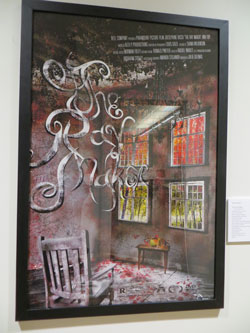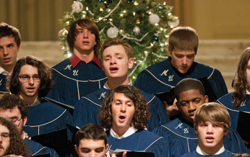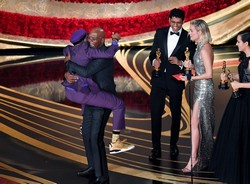The University was host to the inaugural poet Richard Blanco on Tuesday, March 25. Speaking in Pollak Theater, as opposed to the usual Wilson Hall auditorium, he served as the most recent installment in the visiting writer’s series as well as one of the most prestigious speakers to come to campus in the last few years. This event was co-sponsored by the honors school.
Blanco is an awarded poet and civil engineer who lives in Maine. He was the first immigrant, first Latino and first openly gay inaugural poet in history (he read at Obama’s second inauguration). His mother fled Cuba while seven months pregnant, gave birth to him in Spain and then moved to the USA when he was a baby. Growing up in the “cultural purgatory” of Westchester, Fla., he was always conscious of the divide between the version of America he saw on TV, the America he lived in, and his parents, who frequently reminisced about the life and family members they’d left behind. His attempts to find the balance between these worlds influence the majority of his work.
The evening started off with an almost full house and an introduction from Michael Thomas, Associate Dean for the school of humanities. “Blanco’s poems are a testimony to the duality of identity,” Thomas said.
With this, Blanco took to the podium. Beginning with more general statements about his life and his take on poetry, he shared with the audience the emotional and cultural foundation of his work. “The writer’s job is to share something about real life,” he said, mentioning how poetry should function as a mirror for what is really happening in the world.
“In some ways, to be a poet is the most self-indulgent endeavors,” he laughed, “but in some ways, it is the most selfless.”
Throughout the event, he showed pictures from throughout his life, beginning with his first baby photo: the one used for his green card when he first immigrated to America. He talked about how this is a symbolic representation of who he would later become and that it serves as a reminder of how far he has come.
Moving then to discuss his home in Florida, he reminisced about how he felt adrift between the America of which he didn’t feel a part and his parents’ Cuba, to which he couldn’t go. This led him to fall in love with TV shows like “The Brady Bunch,” which portrayed a happy, ideal reality that he might one day find.
He also read a variety of poems, both humorous and serious. His first was “Betting on America,” in which he recounted his family taking bets on which woman would win the Miss USA pageant. With his grandmother acting as the bookie and his grandfather saying one woman would win because, “she’s got great teeth, like a horse,” Blanco both captures a real moment of his past and an accidental satire of such events.
Following this, he spoke about his mother’s influence on his life, and how she served as his lifeline to Cuba, both in reality and in his imagination. This influence prompted him to write “Mother Country,” one of the three pieces he wrote for Obama’s inauguration.
Blanco then went on to talk about his life as an engineer, and how confused people tend to get when he tells them he’s also a poet. Explaining that his work as a poet came from how he fell in love with language while compiling engineering reports, he spoke about how his poems come from both a creative side and an analytical exactitude. To emphasize, he read “Papa’s Bridge,” in which he discussed his ailing father, the bridges that connect people physically and emotionally.
Moving on to more distant relatives, he talked about growing up under his grandmother’s watchful eye, saying that she had very strict rules about what men were supposed to do and that any deviation was “gay,” such as drinking soda with a straw or joining the cub scouts. His poem “Queer Theory According to my Grandmother” came off as humorous to many, especially with lines like, “If I see you in a ponytail, I’m cutting it off.” Blanco acknowledged that many find it funny, though it is a scathing indictment of her bigotry, which forced him to hide his sexual identity for years.
He also talked about the inauguration itself and read his selected piece, “One Today,” saying that it was “almost scripted” that he’d read at the event since he’d been asking “What is my place in America?” since he was a boy. He also laughed about the “amazing” reaction after, saying that people would stop him on the street to cry, talk, hug him, and similar things after being so moved by his piece. “We crashed three gmail accounts,” he laughed (with ‘we’ being his team of agent, photographer, and social media coordinator).
“The response, when people give modern poetry a chance, is amazing,” Blanco said.
He went on to read “Like You” and “Boston Strong,” the latter of which was requested after the Boston Marathon Bombings last year. Blanco also talked about his work with a friend of his who runs an orphanage for abandoned girls, helping them to express themselves through poetry, and read “Counting,” a piece written by one of the girls who lives there.
A Q&A followed the reading, during which he talked about how he didn’t have a first language, having grown up bilingual and how he changed emotionally after the inauguration, feeling as though he now “has permission” to write poems more about America and less about himself.
Paul Brown, President of the University, was especially impressed by Blanco. “That mix of engineering is a really fascinating thought,” he said. “Combining fine arts with a really technical field is a great insight.”
Senior Brianna Winters found him very astute as well. She said, “I felt like he captivated the audience in a way that other visiting writers haven’t. I really enjoyed the way he created the theme of What Poetry Can Do by showing the relevance of poetry in his life.”
“His tone and diction kept my attention throughout the reading, especially as I tried to catch the unintended humor in his poetry,” Winters, an English major, added.
Blanco is just one of the many well-known figures to speak at the University. Pulitzer Prize winner Louise Glück will be reading on April 24. Check Monmouth.edu/arts for details.



